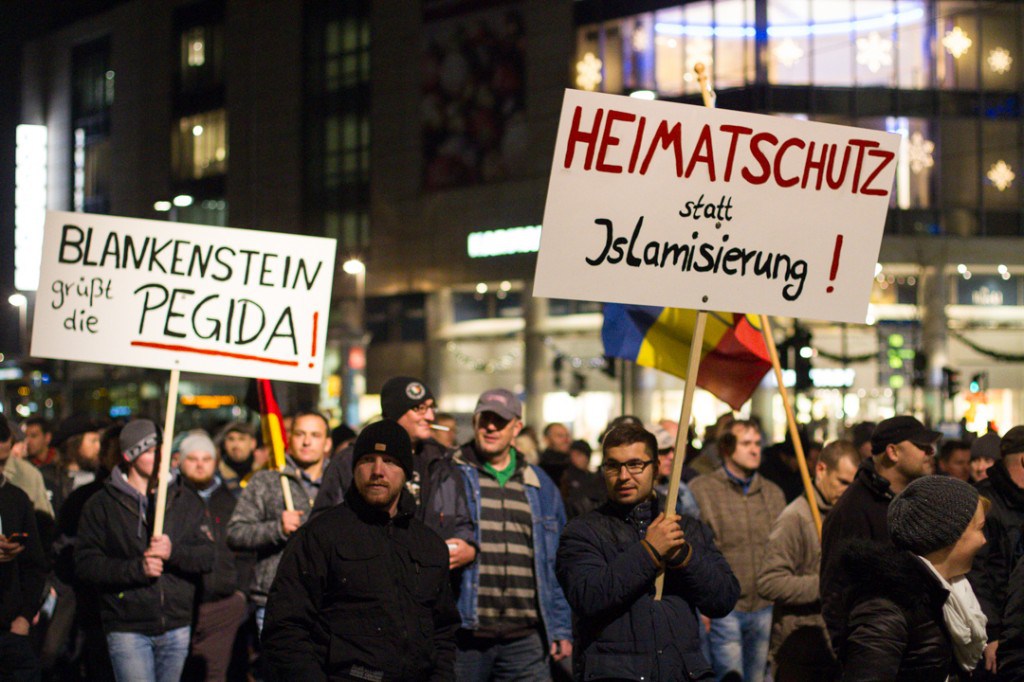By Rebecca Fobbe
Dresden, Germany, 2014. The people are on the streets again, marching through the city once a week. Similar to those Monday demonstrations in Leipzig in the GDR, nowadays demonstrations are not only held in a city in the east of Germany and at the same day as the historical movement that is said to have brought down the GDR, but the people of today’s demonstrations also use the same slogan: “Wir sind das Volk” – “We are the people”.
The only difference is: in 1989 an unbelievable amount of citizens protested against a system similar to a dictatorship that spied on their citizens and terrorized everyone who did not believe in the communist ideals. Now, a select group of people protests against their democracy, against a system that they chose and elected. They pretend to be the voice of the entire population in Germany, even though three out of four Germans reject their organization: PEGIDA.
The official name stands for ‘Patriotic Europeans Against the Islamization of the West’. The movement was founded in October 2014 and caused a wave of political discussions all around Germany. Most politicians as well as other important official figures have called the protesters islamophobic and xenophobic.
But what is the organization really about? In their 19 point position paper, PEGIDA stresses the following viewpoints: It supports multiple smaller aspects of migration policies, such as a decentralized settlement of migrants in opposition to degenerated asylum homes. It supports a centralized EU migration policy with a fair distribution of all asylum seekers. It clearly states that the general admission of refugees (of those who were caused to flee due to war or religious reasons) is necessary and a human right. Additionally, PEGIDA supports a ‘zero-tolerance-policy’ for delinquent migrants or refugees and wants to support the conservation of the traditionally Christian and Jewish Occident.
This shows the acceptance of migrants and refugees by PEGIDA on one hand, but it also shows the want for something different.
The organization is calling for a change of migration policies – namely, stricter rules and admissions. It strongly opposes the establishment of parallel societies, for example the establishment of Sharia law in Germany; and it opposes radicalization, no matter if derived from political or religious viewpoints. So far, these statements can all be argued with or discussed on a political level. But what is happening on the streets in Dresden can no longer be related to these, relatively mild, 19 points. The entire process can be seen as a reaction to different political events.
The first demonstrations were a reaction to radical Islamists who were attacking a group made up of up German citizens who was protesting peacefully against IS. PEGIDA started with a handful of people, but social media made the number of attendees grow and grow. In December, they formally registered and got hold of the status of a NGO. After the attack on the satire magazine Charlie Hebdo in Paris, the group of participants grew even more and counted up to 25.000 people in just one city. But instead of getting more positive followers all over Germany, the criticism grew stronger and stronger. On the 19th of January, Dresden police banned any protests on the street, since there was a clear terrorist threat. But clear terrorists threats were an extreme of criticism against PEGIDA. The general criticism of the broader public focused on the leadership of the NGO and their backgrounds.
Two days after the banned protests, the official leader Lutz Bachmann resigned, due to a number of jeopardizing Facebook pictures with a strong right-winged tendency, such as a self-portray showing him as Adolf Hitler or as a member of the KKK. He purposely made these pictures himself, causing reactions from the German Deputy Chancellor who states that anybody who portrays himself at Hitler ‘is either an idiot or a Nazi.’ Just a week later, five other leading figures stepped back from their positions. But the organization continues. Bachmann is said to still secretly taking the lead and the group is separating.
After the resignation of most of PEGIDA’s leaders it is still open how and if the demonstrations will continue; if they will stick to the 19 point policy of if sub-groups will go a more/or less radical way. One question however can already be asked: How far did PEGIDA go in the process of their demonstrations over the last winter? Even though the general policy shows a patriotic, right-winged approach to Germany’s parliamentary democracy, it does not show the extreme. However, multiple journalists interviewed people on the streets at the demonstrations who uttered strong right-winged and xenophobic statements, such as blaming only immigrants for crimes. PEGIDA, even though blamed and heavily criticized for all of these statements, does not take sufficient action or responsibility in controlling those statements. On the contrary, it seems like PEGIDA is agreeing and happily provides a platform for radicals, Neo-Nazis or other right-wing audiences.
Rebecca Fobbe, Class of 2016, is a Politics and Law major, from Büdingen, Germany.


Not only does Pegida fail to distance itself from extreme groups and statements, but it seems/seemed to be a wild mix of fringe groups with higly diverse opinions. Globalization critics march along with Putin fans, while prototypes of the “enraged citizen” accuse the German media of spreading lies and propaganda. Many seem to have lost faith in politicians and the democratic state. This makes it hard to start a dialogue with Pegida, since approaches by the media and politicians trigger distrust almost automatically. This isolation from the political discourse might also be one of the reasons why the movement is quickly dissolving.